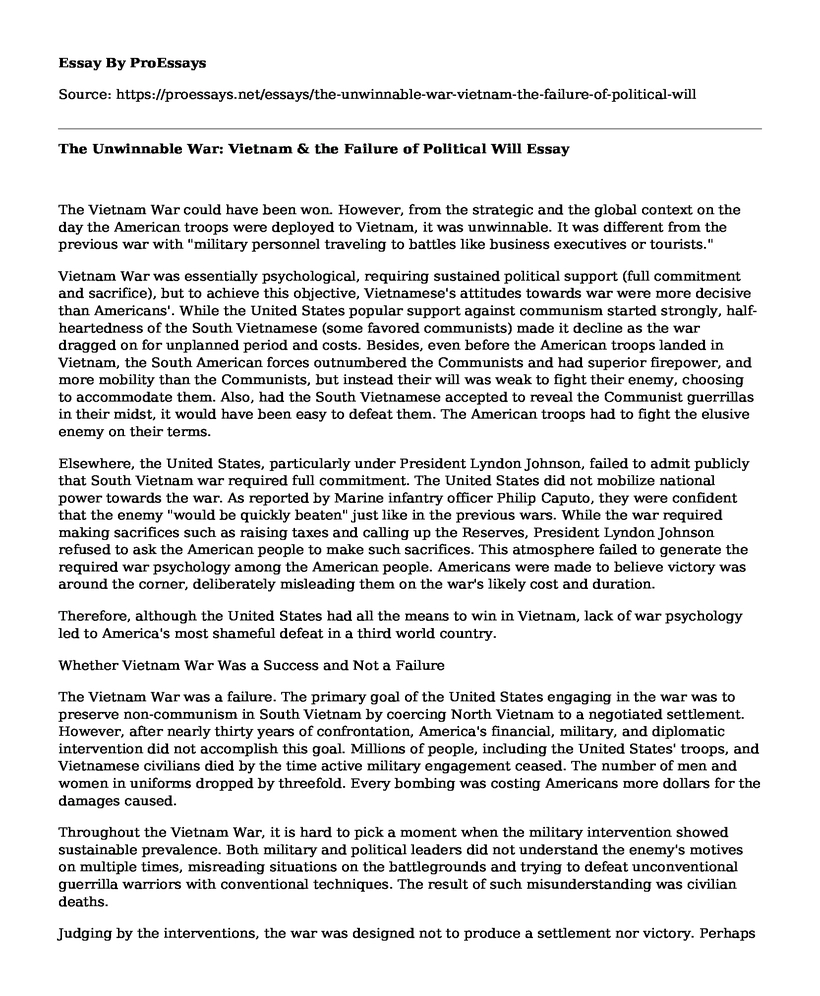The Vietnam War could have been won. However, from the strategic and the global context on the day the American troops were deployed to Vietnam, it was unwinnable. It was different from the previous war with "military personnel traveling to battles like business executives or tourists."
Vietnam War was essentially psychological, requiring sustained political support (full commitment and sacrifice), but to achieve this objective, Vietnamese's attitudes towards war were more decisive than Americans'. While the United States popular support against communism started strongly, half-heartedness of the South Vietnamese (some favored communists) made it decline as the war dragged on for unplanned period and costs. Besides, even before the American troops landed in Vietnam, the South American forces outnumbered the Communists and had superior firepower, and more mobility than the Communists, but instead their will was weak to fight their enemy, choosing to accommodate them. Also, had the South Vietnamese accepted to reveal the Communist guerrillas in their midst, it would have been easy to defeat them. The American troops had to fight the elusive enemy on their terms.
Elsewhere, the United States, particularly under President Lyndon Johnson, failed to admit publicly that South Vietnam war required full commitment. The United States did not mobilize national power towards the war. As reported by Marine infantry officer Philip Caputo, they were confident that the enemy "would be quickly beaten" just like in the previous wars. While the war required making sacrifices such as raising taxes and calling up the Reserves, President Lyndon Johnson refused to ask the American people to make such sacrifices. This atmosphere failed to generate the required war psychology among the American people. Americans were made to believe victory was around the corner, deliberately misleading them on the war's likely cost and duration.
Therefore, although the United States had all the means to win in Vietnam, lack of war psychology led to America's most shameful defeat in a third world country.
Whether Vietnam War Was a Success and Not a Failure
The Vietnam War was a failure. The primary goal of the United States engaging in the war was to preserve non-communism in South Vietnam by coercing North Vietnam to a negotiated settlement. However, after nearly thirty years of confrontation, America's financial, military, and diplomatic intervention did not accomplish this goal. Millions of people, including the United States' troops, and Vietnamese civilians died by the time active military engagement ceased. The number of men and women in uniforms dropped by threefold. Every bombing was costing Americans more dollars for the damages caused.
Throughout the Vietnam War, it is hard to pick a moment when the military intervention showed sustainable prevalence. Both military and political leaders did not understand the enemy's motives on multiple times, misreading situations on the battlegrounds and trying to defeat unconventional guerrilla warriors with conventional techniques. The result of such misunderstanding was civilian deaths.
Judging by the interventions, the war was designed not to produce a settlement nor victory. Perhaps the only success was the key lessons learned from Vietnam failure: if there are no compelling reasons to go to war, there is no need to go to fight at all. Also, sacrifices should be all-inclusive; that is, it should not only be demanded from those who risk their lives directly in the combat.
Cite this page
The Unwinnable War: Vietnam & the Failure of Political Will. (2023, Jan 31). Retrieved from https://proessays.net/essays/the-unwinnable-war-vietnam-the-failure-of-political-will
If you are the original author of this essay and no longer wish to have it published on the ProEssays website, please click below to request its removal:
- Three Ways that Are Important to Having a Happy Life
- The Restructuring of the U.S. Health Care Delivery - Research Paper
- Effects of Government Involvement on Creativity and Innovation - Essay Sample
- Essay Example on Vote Now: Pre-Register to Cast Your Ballot at Age 18!
- Stigma & Mental Illness: Impacts & Discrimination - Essay Sample
- Paper Example on National Immigration Policy: Who Should Regulate?
- Essay Example on Disability







